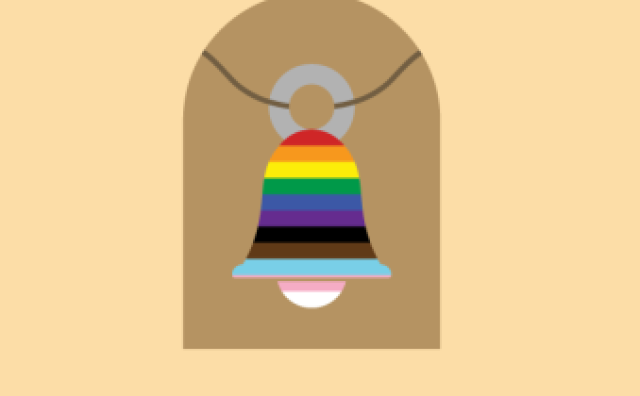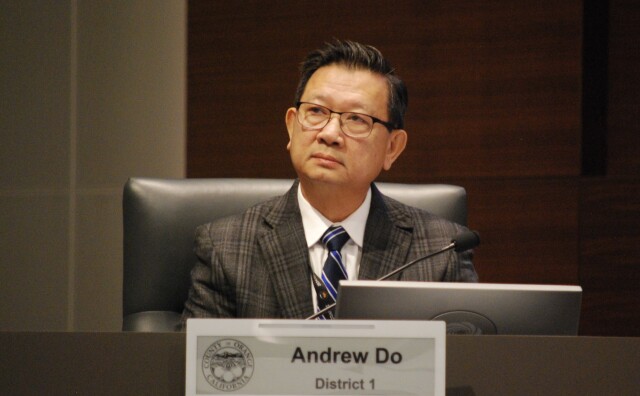San Gabriel City Council Votes To Dissolve DEI Commission, Sparking Disappointment

Despite objections from community members, the San Gabriel City Council voted Tuesday to eliminate a committee formed four years ago to address issues related to diversity, equity and inclusion.
The council voted 3-2 to disband the Human Equity, Access and Relations Commission — known as HEAR — with some council members criticizing the panel for getting into “political issues" when it proposed a safe spaces program focused on LGBTQ communities.
“My whole thing is trying to get national political issues out of our council,” Councilmember John Harrington told a packed meeting Tuesday night.
After the vote, many people who attended expressed their disappointment.
“I think it's part of a larger movement against DEI,” said Viki Goto, the chair of the HEAR Commission.
“When the difficult work begins, after all of the hoopla," Goto said, "it becomes problematic because we are speaking truth to power and those who have benefitted from systems of oppression find it very difficult to give up that privilege and that’s what DEI work is all about.”
Was HEAR too political?
The move to eliminate HEAR came after the commission proposed a program, called "All Are Welcome," intended to provide businesses and organizations a way to show support for the city’s LGBTQ community. The City Council later rejected the program, calling it “too narrow.”
-
Why L.A. is considering a new department
-
Hiking in the Sierra? Check out this new tool
-
What a change in federal rules could mean
On Tuesday, Harrington criticized the commission for getting involved in a “political issue,” after which someone in the audience shouted: “My identity is not political.”
“The more we go down this road, the more divisive it gets,” Harrington responded. “To say it's not political is naive.”
Harrington also said he doesn’t think the city has a problem with anti-LGBTQ discrimination.
“There is nothing in our city where somebody can say the city of San Gabriel has this policy and it’s excluding people,” he said.
In a letter read aloud at the meeting, Congressmember Judy Chu — a Democrat who represents the area — said city leaders should address discrimination beyond the walls of City Hall.
“As leaders within our community, it is incumbent upon us to ensure that every resident feels not only safe but truly embraced, especially because of the concerning rise in discrimination against LGBTQIA+, Jewish, Muslim and immigrant communities across the country,” Chu said.
How the council voted
Councilmembers Denise Menchaca, Eric Chan and Harrington voted in favor of eliminating HEAR.
Mayor John Wu and Councilmember Tony Ding voted to retain it.
During the meeting, Wu suggested the dispute was about how HEAR was operating rather than its LGBTQ program.
“None of the members here discriminate or against the LGBTQ community,” he said, adding that the panel should be given a chance to amend the LGBTQ program.
But the majority of the council chose not to follow Wu’s suggestion.
Menchaca, who first suggested to the council last month that HEAR had “run its course,” said the committee should not be about “a single issue.”
“When the commission was established, it was for the purpose of addressing all human relations issues,” she said.
Several members of the audience who spoke at the meeting pointed out the commission has addressed a wide range of issues from hate directed at Asian and Pacific Islander communities to mental health wellness.
“The decision the City Council makes this evening shall have broad implications and sends a clear message as to what type of community San Gabriel is,” said David Localio, a 19-year resident of the city.
Felix Nunez, who said he had lived in San Gabriel 22 years, pointed out that the LGBTQ community had suffered harassment and repression, and he warned members of the council that he and others were watching how they decided this issue.
“Council, we are here, we are listening and we vote,” Nunez said.

A handful of people expressed support for dissolving the HEAR Commission.
George Carney, a lifelong resident of San Gabriel, said in a letter to the council that the original intent of the panel was positive.
“The HEAR Commission has more recently devolved into a strident advocacy group pushing a narrow vision of ideological purity and conformity,” Carney said. He called the program to encourage businesses to support the LGBTQ community with stickers on their windows an effort to “coerce and bully” businesses.
When Menchaca first proposed eliminating HEAR last month, she suggested the city direct its “limited staff resources” to other matters, including homelessness and mental health needs.
Goto, the HEAR commission chair, called the proposal “ shocking” and “drastic,” and drew a direct link between the proposal to eliminate the commission and the council’s reaction to the All Are Welcome program.
The 'All Are Welcome' program
First proposed to the City Council in February, the program grew out of a community survey conducted by HEAR in which 10% of respondents said the commission needed to address LGBTQ issues.
According to a city document, it was designed to identify “inclusive and welcoming” businesses “where people can feel comfortable being their authentic selves regardless of their sexual orientation, gender identity or gender expression.”
Businesses and organizations that wished to participate would have received a video on LGBTQ rights and a rainbow-colored sticker in the shape of the San Gabriel Mission bell to display in their windows.
The bell is the city’s logo.
-
After San Gabriel's city council rejected the proposal as "too narrow", one city councilmember argued the entire DEI commission, created in the aftermath of George Floyd's murder, had "run its course."
-
Los Angeles City Council President Paul Krekorian has yet to schedule a meeting to discuss ethics reforms — more than a year-and-a-half after they were first proposed.
-
Incumbent George Gascón faces a more conservative challenger, Nathan Hochman, on the November ballot. The race could drive passions and fundraising on the part of advocates for more reforms and backers of law and order policies.
-
Supervisor Andrew Do directed millions to the group, which was supposed to go toward feeding needy residents. “If they can’t prove then they should pay the money back,” Supervisor Katrina Foley told LAist.
-
Orange County officials say they are scrambling to understand what’s happening at a county-funded nonprofit led by O.C. Supervisor Andrew Do’s 22 year-old daughter. The county says the group has failed to account for millions in taxpayer dollars.
-
As the March 5 primary draws closer, many of us have yet to vote and are looking for some help. We hope you start with our Voter Game Plan. Since we don't do recommendations, we've also put together a list of other popular voting guides.






